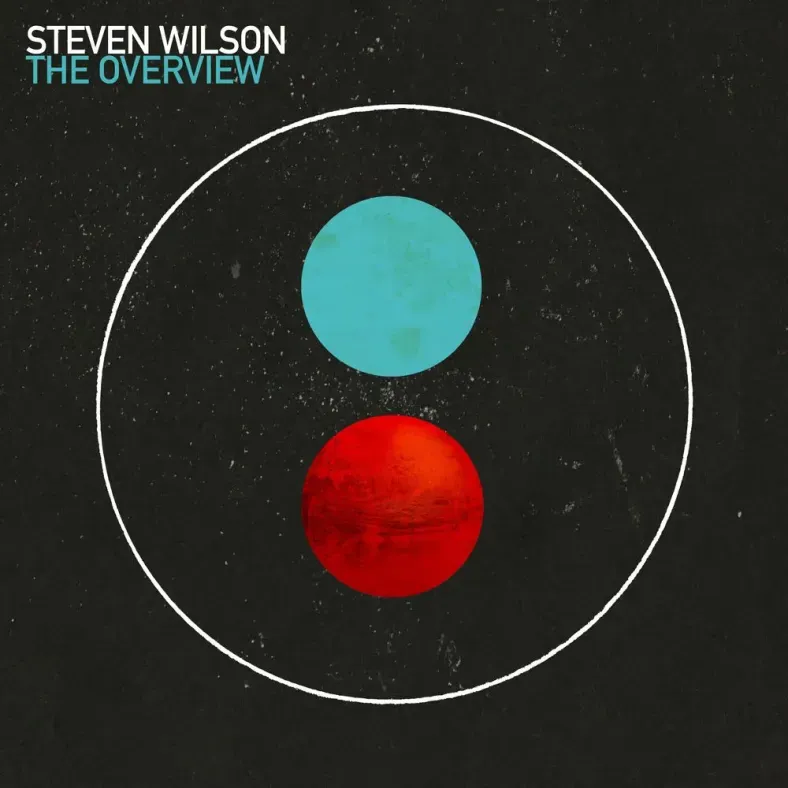The Overview - Steven Wilson | Album Review

Overview
| Band | Steven Wilson |
|---|---|
| Origin | UK |
| Genre | Progressive Rock, Art Rock, Post-Progressive |
| Release Date | March 14th, 2025 |
| Label | Fiction |
Personnel
- Steven Wilson - Vocals, Guitar, Bass, Drum Programming, Keyboards, Percussion, Piano, Pump Organ, Production, Mixing
- Adam Holzman - Piano, Synthesizer, Rhodes, Vocals (backing)
- Randy McStine - Guitar, Keyboards, Effects, Ukelele, Vocals (backing)
- Niko Tsonev - Guitar
- Craig Blundell - Drums
- Theo Travis - Saxophone
- Rotem Wilson - Voice
Review
Version en Español
Steven Wilson es uno de esos músicos tan grandes que, en teoría, no necesitaría presentación, pero sorprendentemente, sí la necesita. Sigue siendo uno de los genios menos conocidos de la industria musical, a pesar de una carrera con más de 20 álbumes de estudio en distintos proyectos, incluyendo la influyente banda Porcupine Tree y una exitosísima carrera solista. Figura clave de la escena del rock progresivo británico, Wilson es también un prolífico productor musical y mezclador, famoso por sus meticulosas remezclas de álbumes icónicos del rock y pop.
En 2024, después de una gira mundial con Porcupine Tree, Wilson volvió al estudio con la idea de armar un álbum conceptual – un giro respecto a lo que venía haciendo en los últimos años. Fiel a su estilo, y a pesar de haber explorado nuevos terrenos sonoros en sus dos discos anteriores, buscó innovar una vez más con otro proyecto ambicioso, un sello característico en toda su diversa obra.
"The Overview" toma su nombre y concepto del cambio cognitivo que experimentan los astronautas al ver la Tierra desde el espacio por primera vez. Profundiza en esa potente sensación de insignificancia humana ante la inmensidad del universo, explorando reacciones que van desde la angustia existencial hasta una contemplación llena de esperanza. Aunque Wilson a menudo ha rechazado la etiqueta de "rock progresivo", sintió que este concepto en particular se expresaba mejor dentro de ese marco estilístico, marcando un regreso deliberado a esa paleta sonora.
Vamos a meternos de lleno en el álbum. Una mirada al listado de canciones revela de inmediato su estructura poco convencional: técnicamente, son solo dos canciones, cada una de más de 18 minutos. Dado este formato, exploraré el disco analizando los distintos movimientos con nombre propio dentro de estas dos piezas mayores.
La primera gran sección, "Objects Outlive Us", arranca con "No Monkey's Paw". Esta apertura presenta la voz de Wilson en un estilo que recuerda a trabajos anteriores, estableciendo de inmediato una atmósfera nostálgica pero cósmica que calza perfecto con el tema del álbum. Transiciona hacia "The Buddha of the Modern Age", que se construye a partir de un patrón simple de piano y platillo ride, para luego dar paso a la característica y deliberada forma de cantar de Wilson. Aunque podría sonar repetitivo, la introducción de coros le añade una capa textural interesante.
El tercer movimiento, "Objects: Meanwhile", introduce una estructura musical poco convencional, que recuerda ideas de álbumes como The Raven that Refused to Sing. Wilson ha mencionado a Pink Floyd como influencia, y eso es palpable aquí, particularmente en las guitarras al estilo de David Gilmour – una línea sonora también explorada en "Impossible Tightrope" de su álbum anterior, The Harmony Codex. La pieza concluye con un cambio sorprendente, con un bajo distorsionado y un solo de guitarra cargado de efectos que evoca eficazmente la sensación de estar flotando en el espacio.
Continuando con la primera sección, "The Cicerones / Ark" muestra una guitarra acústica bellamente arpegiada, quizás otro guiño a The Raven, antes de intensificarse con distorsión añadida. Le sigue "Cosmic Sons of Toil", un pasaje instrumental con sintetizadores, piano y bajo tejiendo texturas espaciales junto a riffs de guitarra poco convencionales y solos distorsionados. "Objects Outlive Us" concluye con "No Ghost on the Moor / Heat Death of the Universe". Esta pieza ambiental retorna lentamente a la sensación del inicio cuando la voz de Wilson reaparece, construyendo hacia otra sección instrumental influenciada por Pink Floyd. Una caja (tarola) bañada en reverb y delay realza la sensación espaciosa, terminando con un oscuro pasaje electrónico que prepara el terreno para la segunda mitad del álbum.
La segunda sección (y canción que da título al disco), "The Overview", empieza con "Perspective". Esta pieza se apoya fuertemente en la electrónica desde el principio, con osciladores, sintetizadores y patrones de batería electrónica. Una voz femenina recita términos relacionados con el espacio, nombrando galaxias y conceptos científicos. La siguiente parte, "A Beautiful Infinity / Borrowed Atoms", cambia a una estructura más tradicional con un patrón de batería directo en 4/4, guitarra y teclado. Esto lleva a una sección vocal característicamente nostálgica de Wilson, con una sensación de tonalidad menor, manteniendo el tema cósmico y espacial. Sin embargo, aunque agradable, su relativa simplicidad se siente algo menos innovadora comparada con movimientos anteriores.
Las partes finales llegan con "Infinity Measured in Moments", que inicialmente continúa la melodía anterior de forma atmosférica solo con sintetizadores, antes de que la voz de Wilson regrese con más efectos. Incluye otro solo de guitarra "espacial", una sección de puente con aplausos y un impresionante solo de teclado hacia el final, sirviendo como un puente perfecto para el cierre. "Permanence" concluye el álbum, una pieza centrada en sintetizadores que introduce un saxofón que, por momentos, evoca comparaciones con Sade.
Con The Overview, Steven Wilson lo logra de nuevo. Revisita ideas de su pasado pero sigue innovando dentro de un marco conceptual claro. A menudo se siente como si mezclara elementos de toda su discografía en cada nuevo lanzamiento, pero siempre consigue aportar conceptos musicales frescos. Su fortaleza quizás radica menos en la pura complejidad compositiva y más en su tremenda habilidad en la producción – usando la musicalidad y la sonoridad para crear narrativas sonoras convincentes. Este se erige como uno de los álbumes más sólidos de su carrera, posiblemente el mejor desde la era de Hand. Cannot. Erase. ¡No puedo esperar a verlo en vivo presentando este material!
Steven Wilson is one of those significant musicians who arguably shouldn't need an introduction, yet surprisingly often does. He remains one of the music industry's lesser-known geniuses despite a career spanning over 20 studio albums across various projects, including the influential Porcupine Tree and a highly successful solo career. A staple of the British progressive rock scene, Wilson is also a prolific music producer and mixer, known for his meticulous remixes of iconic rock and pop albums.
In 2024, following a world tour with Porcupine Tree, Wilson returned to the studio intent on crafting a concept album—a departure from his work over the previous few years. True to form, despite exploring new sonic territories on his last two albums, he aimed to innovate once more with another ambitious project, a characteristic approach evident throughout his diverse body of work.
"The Overview" draws its name and concept from the cognitive shift astronauts report experiencing upon first viewing Earth from space. It delves into the profound sense of human insignificance within the vastness of the universe, exploring reactions ranging from existential overwhelm to hopeful contemplation. While Wilson has often resisted the "progressive rock" label, he felt this particular concept was best expressed within that stylistic framework, marking a deliberate return to the genre's sonic palette.
Let's dive into the album. A glance at the tracklist reveals its unconventional structure: technically just two songs, each exceeding 18 minutes. Given this format, I'll explore the album by examining the distinct, named movements within these two larger pieces.
The first major section, "Objects Outlive Us," begins with "No Monkey's Paw." This opening features Wilson's singing in a style reminiscent of his previous work, immediately establishing a nostalgic yet cosmic atmosphere that perfectly suits the album's theme. It transitions into "The Buddha of the Modern Age," which builds from a simple piano and ride cymbal pattern into Wilson's distinct, deliberate vocal delivery. While potentially repetitive, the introduction of backing vocals adds an interesting textural layer.
The third movement, "Objects: Meanwhile," introduces an unconventional musical structure, echoing ideas found on albums like The Raven that Refused to Sing. Wilson has mentioned Pink Floyd as an influence, and it's palpable here, particularly in the David Gilmour-esque guitar work—a sonic thread also explored on "Impossible Tightrope" from his previous album, The Harmony Codex. The piece concludes with a striking shift, featuring distorted bass and an effects-laden guitar solo that effectively evokes a feeling of being adrift in space.
Continuing the first section, "The Cicerones / Ark" showcases beautifully arpeggiated acoustic guitar, another nod perhaps to The Raven, before intensifying with added distortion. Following this is "Cosmic Sons of Toil," an instrumental passage featuring synthesizers, piano, and bass weaving spatial textures alongside unconventional guitar riffs and distorted solos. "Objects Outlive Us" concludes with "No Ghost on the Moor / Heat Death of the Universe." This ambient piece slowly returns to the feel of the opener as Wilson's voice reappears, building into another Pink Floyd-influenced instrumental section. A snare drum drenched in reverb and delay enhances the spacious feel, ending with a dark electronic passage that sets the stage for the album's second half.
The album's second section (and title track), "The Overview," starts with "Perspective." This piece leans heavily into electronics from the outset, featuring oscillators, synthesizers, and electronic drum patterns. A female voice recites space-related terms, naming galaxies and scientific concepts. The next part, "A Beautiful Infinity / Borrowed Atoms," shifts to a more traditional structure with a straightforward 4/4 drum pattern, guitar, and keyboard. This leads into a characteristically nostalgic Wilson vocal section with a minor-key feel, maintaining the cosmic, spatial theme. However, while pleasant, its relative simplicity feels slightly less innovative compared to earlier movements.
The final parts arrive with "Infinity Measured in Moments," which initially continues the preceding melody atmospherically with only synths, before Wilson's voice returns layered with effects. It features another spacey guitar solo, a clapping bridge section, and an impressive keyboard solo towards the end, serving as a perfect bridge to the finale. "Permanence" concludes the album, a synth-focused piece introducing a saxophone that momentarily evokes comparisons to Sade.
With The Overview, Steven Wilson delivers yet again. He revisits ideas from his past while still innovating within a distinct conceptual framework. It often feels as though he synthesizes elements from his entire discography into each new release, yet consistently manages to introduce fresh musical concepts. His strength lies perhaps less in sheer compositional complexity and more in his production prowess—using musicality and sonority to craft compelling sonic narratives. This stands as one of the strongest albums of his career, arguably the best since the Hand. Cannot. Erase. era. I can't wait to see him perform this material live!
Final Scoring
Track List (Spotify Version)
Disc 1
- Objects Outlive Us [23:19]
- The Overview [18:21]
Disc 2
- Objects Outlive Us: No Monkey's Paw [1:59]
- Objects Outlive Us: The Buddha of the Modern Age [2:26]
- Objects Outlive Us: Objects: Meanwhile [6:31]
- Objects Outlive Us: The Cicerones / Ark [3:42]
- Objects Outlive Us: Cosmic Sons of Toil [3:00]
- Objects Outlive Us: No Ghost on the Moor / Heat Death of the Universe [6:00]
- The Overview: Perspective [4:56]
- The Overview: A Beautiful Infinity / Borrowed Atoms [5:19]
- The Overview: Infinity Measured in Moments [5:06]
- The Overview: Permanence [3:24]
